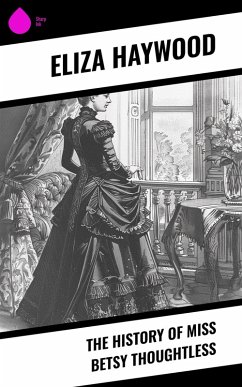Eliza Haywood knew that women were just as tempted as men were to live. In this novel Eliza Haywood explores and writes about the woman's desire, sex, unwanted pregnancy and adultery in 18th century society. Betsy, the protagonist of the story, at first listens with astonishment as her friend describes being seduced and how "being seduced" is fun, but later she herself worries that if she lets her love escort her home, she won't be able to contain her desire for him.
Dieser Download kann aus rechtlichen Gründen nur mit Rechnungsadresse in A, B, BG, CY, CZ, D, DK, EW, E, FIN, F, GR, HR, H, IRL, I, LT, L, LR, M, NL, PL, P, R, S, SLO, SK ausgeliefert werden.


